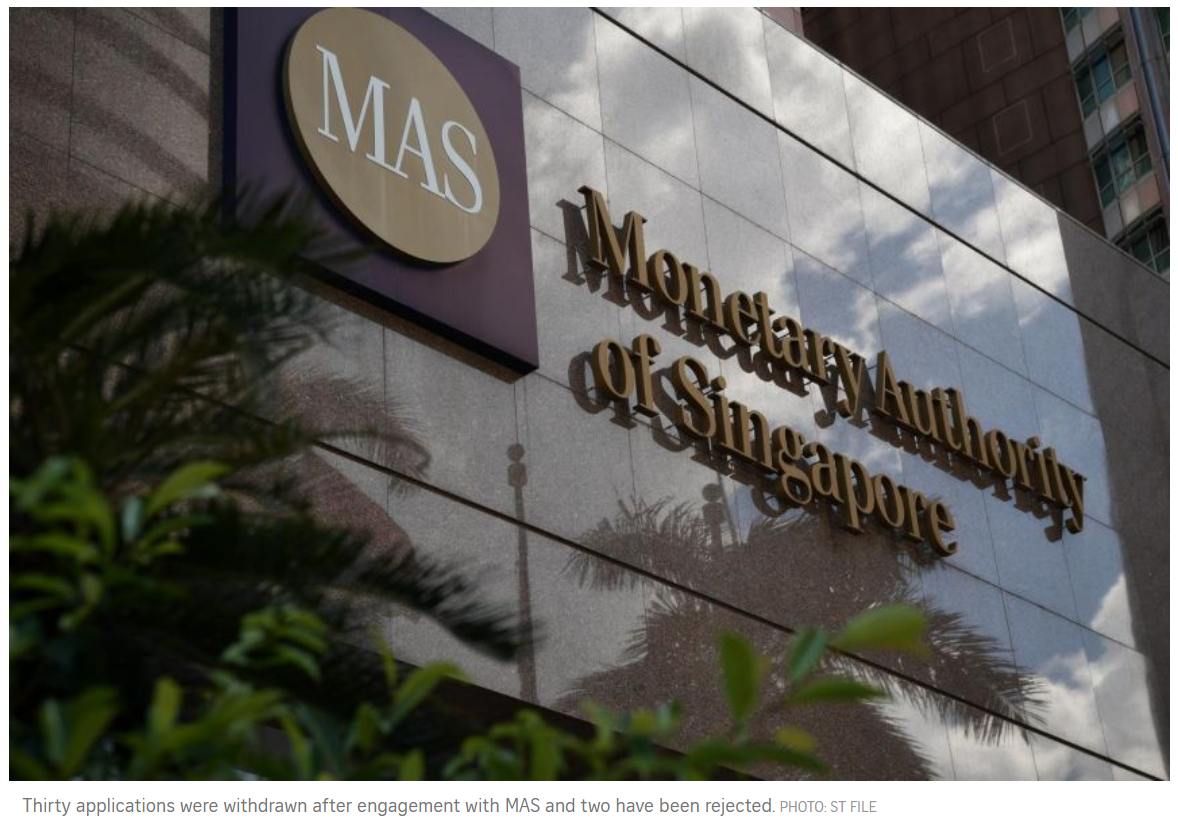Singapore: MAS grants crypto licences to DBS unit and Australian exchange; more licences expected to be issued
SINGAPORE – DBS Vickers on Friday (Oct 1) secured a Singapore licence to offer digital payment token services, while Australian cryptocurrency exchange Independent Reserve became the first foreign entity to be granted one.
Examples of digital payment tokens are cryptocurrencies like Bitcoin, ether and litecoin.
Industry observers expect more such licences under the Payment Services Act (PS Act) to be rolled out in the coming months as the Monetary Authority of Singapore (MAS) has recently given its in-principle approval to several applicants.
The first licence was issued to Singapore fintech firm Fomo Pay last month.
The regulatory approvals are being granted at a time when cryptocurrency firms are facing intense scrutiny from worldwide regulators amid the fast-growing digital asset industry, which is currently valued at US$1.91 trillion (S$2.59 trillion).
With the licence, DBS Vickers, the brokerage arm of DBS and a member of DBS Digital Exchange (DDEx), will be able to directly support asset managers and companies to trade in digital payment tokens through DDEx.
The Singapore Exchange has a 10 per cent stake in DDEx.
DDEx bills itself as the world’s only bank-backed full service digital bourse, offering cryptocurrency trading, asset tokenisation and digital custody services.
Ms Eng-Kwok Seat Moey, head of capital markets at DBS and chairman of DDEx, told The Straits Times: “We have seen robust demand from our clients since DDEx was launched in December last year (2020). We expect to double the number of participants on DDEx to 1,000, as well as to grow this by 20 per cent to 30 per cent annually over the next three years as digital tokens and cryptocurrency trading gain greater adoption.”
As at end-June, the members-only bourse for corporate investors, accredited individuals and family offices had around 400 investors and listed its inaugural security token offerings in the form of an $15 million digital bond that month. Total trading value surged to about $180 million in the second quarter of this year, more than five times the value traded in the previous quarter.
MAS has received 170 licence applications from digital payment token service providers, including from global crypto exchanges such as Coinbase and Kraken. Thirty applications were withdrawn after engagement with MAS and two have been rejected.
Singapore’s regulations are seen to be crypto-friendly and have been attracting global cryptocurrency firms to set up offices here.
Binance – the world’s largest crypto exchange by trading volume – has a Singapore presence through Binance Asia Services, while Chinese firm Huobi has its two local affiliates, Huobi Asset Investments and Huobi Mall.
Independent Reserve, which was founded in Australia in 2013 and now has more than 230,000 users in Australia and New Zealand, chose to set up its first overseas office in Singapore in 2019.
Mr Raks Sondhi, the managing director of Independent Reserve Singapore, told ST that regulation is one of the largest drivers of the cryptocurrency industry, as firms seek to be regulated and move out of the grey area in which many larger players have been operating under.
Mr Sondhi said Independent Reserve Singapore, which provides digital asset exchange and over-the-counter trading services to people and institutions here, currently has three employees and the firm is actively hiring as it launches its first marketing campaign here on Friday.
Assistant Professor Ben Charoenwong, of the department of finance at the National University of Singapore Business School, said MAS’ regulations has positioned Singapore as a potential crypto hub in the future.
“Compared with regulators in China and even the United States, Singapore takes a less stringent approach. We can expect large cryptocurrency exchanges and ventures to enter Singapore,” said Prof Charoenwong.
Last month, MAS ordered Binance to cease providing payment services to Singapore residents and also to stop soliciting such business from Singapore residents, as it does not have a licence to do so.
In response, Binance announced on Monday that it will stop Singapore users from buying and trading cryptocurrencies on its main global platform and advised users to cease all related trades, withdraw fiat assets and redeem tokens by noon on Oct 26.
However, users can still register for an account and trade on its local platform – Binance.sg – which is allowed to operate under an exemption from holding a licence as its licence application is being reviewed by MAS.
In Singapore, digital payment token service providers are regulated primarily for the purpose of preventing money laundering and terrorist financing.
MAS had said earlier that the regulation does not extend to consumer protection and MAS does not regulate the digital payment token itself.
Surveys have found that more Singaporeans now own some form of the virtual cash, while others are keen to add it to their investment portfolios.
“We have seen institutions like Tesla, family offices and even small and medium-sized enterprises investing or adding cryptocurrencies, namely Bitcoin, to their balance sheets,” said Mr Sondhi, adding that his Singapore customer base has surged 500 per cent since August this year.
Said Ms Eng-Kwok: “As institutional demand for investments in digital assets continues to rise, we have seen growing interest among asset managers and corporates for access to digital payment token services through a trusted platform.
“DBS Vickers, as a member of DDEx, is well placed to support institutional and corporate investors on this front.”
Source: https://www.straitstimes.com/business/banking/mas-grants-crypto-licences-to-dbs-and-australian-exchange-more-licences-expected-to


 English
English




